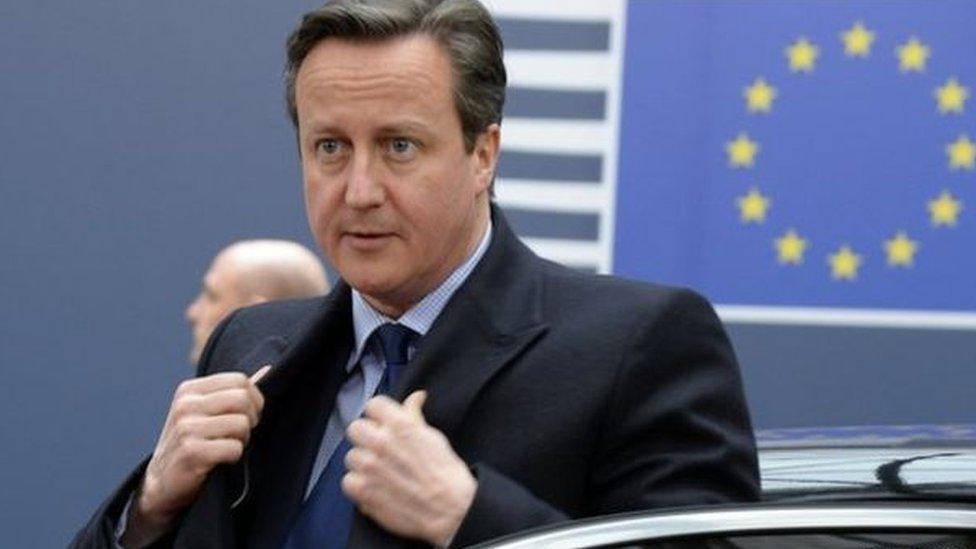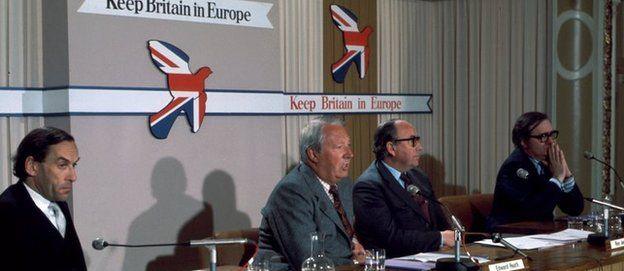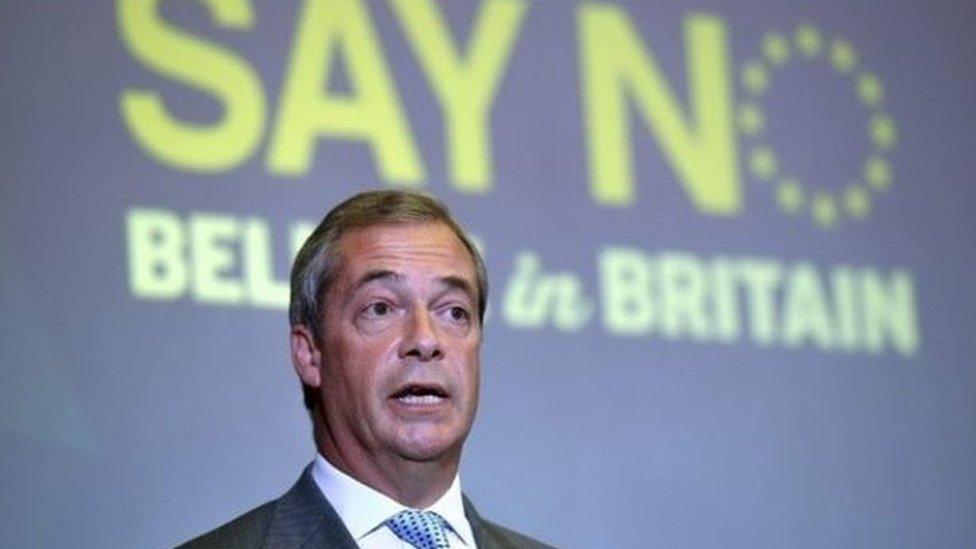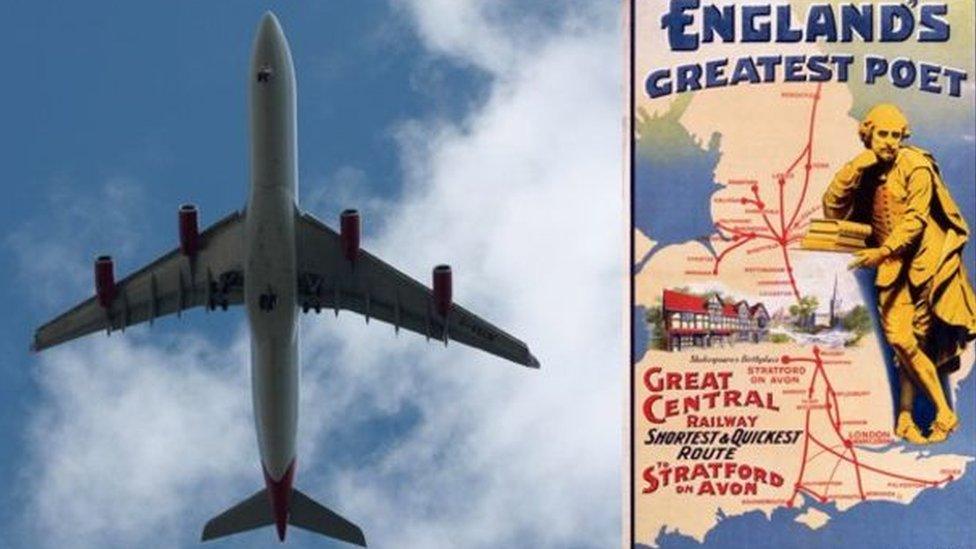Midlands Tories prepare for new battles
- Published
- comments

Are we in or out? The Conservative Party will hold a referendum about staying in Europe before the end of 2017
While Labour, UKIP and the Liberal Democrats start repairing the damage after their various general election disappointments, there will be little opportunity for Conservative activists to gloat when they arrive in Manchester for their autumn conference.
Even as they celebrate their generally unexpected victory last May, they are only too aware of daunting challenges piling up thick and fast.
David Cameron is committed to an 'In or Out?' Referendum before the end of 2017.
But over the past year he has repeatedly hinted that he could make his move earlier than that. Possibly MUCH earlier.
In my interview last week with Nigel Farage, it was clear that he for one is focussing more on the referendum than on UKIP.
Mr Farage told me he thought it could come as early as next March.
The theory goes that after the first European Council of the year in January, he may feel he has secured the best "renegotiation" deal he is going to get on issues such as border controls and 'benefits tourism', national parliaments working together to block unwanted EU legislation, reduced "interference" in the work of British courts and police, and a curtailment of the concept of "ever closer union" in the EU.

A flashback to earlier times: Edward Heath and Roy Jenkins campaign for a yes vote in the 1975 EU referendum
But at what cost to his party?
As a former government whip, the Labour MP for Birmingham Selly Oak, Steve McCabe, knows a thing or two about party discipline.
He told me on last week's "Sunday Politics" Mr Cameron was taking "a huge risk" which could "tear his party apart".
Influential Tories close to the Prime Minister, (Bromsgrove's Sajid Javid, South Staffordshire's Gavin Williamson for example) can be expected to act as high profile cheer leaders for whatever terms he comes back with.
But the same can hardly be said of such arch-Eurosceptics as Owen Paterson (Shropshire North) or Bill Cash (Stone). They have shown every sign so far that they will be determinedly hard to please which in turn will maintain maximum pressure on Mr Cameron himself. By extension, many thousands of grass roots Tories could find themselves being dragooned into one camp or the other.
PCC Elections
I do realise it's not exactly the buzz on the streets at the moment but next May's elections for police and crime commissioners will be an early test of the main parties' respective electoral credentials.

UKIP will campaign to leave the European Union
Of our region's five commissioners, three (Gloucestershire, Warwickshire and West Mercia) are independents, one (Staffordshire) is Conservative and the biggest of them all (West Midlands) commands an overwhelming Labour majority.
But if the current poll ratings are correct, the Conservatives will hope to add to their tally: a ComRes poll earlier this month showed the Conservatives on 42% and Labour on 30%.
These contests are major events for local communities in their own right of course. But they will also help to prove or disprove the conventional wisdom that Jeremy Corbyn is Labour's greatest electoral liability for many years. The counter argument goes that during his victorious leadership campaign he displayed an ability to speak directly to people with an "unspun" clarity and authenticity which contrasted sharply with the neutered messages presented by his rivals in his party, and in other parties too.
He appears to be seizing the mantle of the "anti-politician's politician" worn so effectively for so long by the aforementioned Mr Farage. If his anti-austerity message is to gain traction, we would expect to find evidence of it in the debate about the squeeze on police funding.
Which leads in turn to what could develop into the Conservatives' biggest headache of all.
False Economy?
We have become accustomed to a seemingly unending flow of headlines about "the fastest-growing economy in the developed world", record numbers of business start-ups in the Midlands region which, uniquely, enjoys a trade surplus with China. It's all been underlined by a series of 'good news' stories about Birmingham rapidly emerging from its economic woes as the next Big Boom Town, the destination of choice for the clever money seeking a sharp exit from the overheated capital.

Birmingham Airport has been branding itself as Shakespeare's Airport to appeal to the Chinese market
So it came as a real jolt when the news broke, halfway through George Osborne's trade mission to China, that 400 jobs are at risk at the Staffordshire digger-maker JCB because of the global slow-down. After all those years of talking-up our links with 'emerging markets', their chief executive Graeme Macdonald made it sound like a perfect storm combining China with the effects of sanctions against Russia and political turmoil in Brazil.
So Mr Osborne's emphasis on Chinese investment in major projects like high speed real and nuclear power stations clearly begs the question: is he hitching his wagon to a faltering 'economic engine'?
Already many of the economic certainties at the time of the election are looking much dubious. I have even heard talk of a recession as soon 2018. The economic storm clouds may yet threaten the Government's oft-repeated pledge to 'fix the roof while the sun's shining'. A sudden downpour would be the last thing any Conservative activist, let alone a potential future prime minister, would want.
But it is to the present incumbent of Downing Street that I will be talking as he prepares for his conference. See what David Cameron makes of these and the other questions I plan to talk to him about on this weekend's 'Sunday Politics Midlands' from 11.00 BST on BBC One.